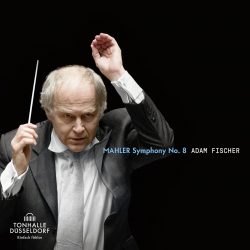Classical CD Reviews: Ádám Fischer conducts Mahler, Mariss Jansons conducts Rodion Shchedrin & Respighi, and John Eliot Gardiner conducts Schumann
By Jonathan Blumhofer
Ádám Fischer’s reading of Mahler’s Eighth Symphony is breathtakingly clean, texturally; the first of BR Klassik’s Mariss Jansons’s releases since the conductor’s death late last year is one of the label’s most programmatically surprising; John Eliot Gardiner’s compelling Schumann symphony cycle is complete.

Gustav Mahler isn’t a composer one usually associates with unalloyed joy. Yet his Eighth Symphony, with its emphasis on spiritual illumination and love (as expressed through the composer’s adaptation of the Medieval Latin hymn “Veni, creator spiritus” and Part 2 of Goethe’s Faust), is essentially celebratory: in the end, light triumphs – resoundingly – over darkness.
Ádám Fischer’s new recording of the so-called “Symphony of a Thousand” with the Düsseldorfer Symphoniker, assorted soloists, and four choirs (the Choir of the Städtischer Musikverein zu Düsseldorf, Philharmonischer Chor Bonn, Kartäuserkantorei Köln, and Clara-Schumann-Jugendchor Düsseldorf) certainly captures much of the score’s wonder and exuberance. That’s no small feat, especially considering that the recording was drawn from live performances in Düsseldorf last July.
True, there are more than a few fine Mahler Eights out there already. The qualities this one brings to the mix, though, are striking.
First, Fischer’s reading is breathtakingly clean, texturally. This is partly a result of a close attention to dynamic details, especially over the Eighth’s Part 1; partly a matter of careful engineering. Regardless, the results are both lustrously colorful and harmonically bracing: paying such close attention to the nuances in this sprawling score brings out a surprising degree of dissonance that, in other performances, simply gets lost in the wash.
The conductor’s larger approach to the piece is, essentially, Classical, which ultimately benefits this sprawling work. Indeed, with the exception of a weird slow-down in the last couple of pages leading up to Part 1’s recapitulation, tempos move smartly throughout and there isn’t much drawing out of the musical line – at least not at the expense of the Eight’s dramatic design.
By and large, the symphony’s vocal contributions are well cast. Yes, there are some moments of spotty rhythmic coordination here and there (which is not surprising, given the live taping) and, in Part 2, Katharina Magiera’s Maria Aegyptiaca is a hair under pitch.
On the plus side, the trio of sopranos – Manuela Uhl, Polina Pastirchak, and Fatma Said – are superb (the latter’s Mater Gloriosa is downright radiant) and Hanno Müller-Brachmann’s Pater Ecstaticus comes across grandly.
Neal Cooper manages the punishing tenor solos really nicely, singing with full-bodied tone and an impressive degree of agility. He never sounds forced, though sometimes (like in “Hier ist die Aussicht frei”) is placed a bit far back in the mix; “Blicket auf!” offers better presence (as well as a friendlier tessitura).
The massed choirs imbue their parts with fine diction and a strong sense of rhythm. Particularly strong are the clarion voices of the Jugendchor.
Where does this leave us, then? Well, Solti’s Mahler Eight remains the most electrifying and this one doesn’t displace Bernstein’s, Gielen’s, Abbado’s, or Tennstedt’s. But it largely holds its own with those, providing a degree of technical precision and expressive immediacy that one doesn’t always encounter in this piece. Recommended.

The first of BR Klassik’s Mariss Jansons releases since the conductor’s death late last year is one of the label’s most programmatically surprising and, for half of it, musically satisfying.
For the latter, I’m referring to Jansons’s reading of Rodion Shchedrin’s 1967 Carmen Suite. Written for the composer’s wife, the ballerina Maya Plisetskaya, it incorporates music from Bizet’s famous opera, plus snatches of the second L’Arlésienne Suite and La jolie fille de Perth. Scored for strings, timpani, and four percussion groups, this is a piece that’s at once playfully familiar, thoroughly ingratiating, and sometimes quite harrowing.
The performance Jansons draws from the Bavarian Radio Symphony Orchestra (BRSO) on this disc captures each of these qualities. On the one hand, the string playing is roundly fervent and colorful, from the lilting “Dance” to the dreamy “Intermezzo no. 2” and the swaggering “Torero.”
What’s more, Shchedrin’s percussion writing provides new angles for hearing and considering these familiar tunes. The mallet percussion in the “Intermezzo no. 1” and “Finale,” for instance, actually serve to underline the fatalistic aspects of Bizet’s opera. The drums in “Boléro” (which adapts music from the L’Arlésienne Suite) draws out the music’s rustic character. And so on.
Throughout, the BRSO’s playing is spirited and rhythmically driven: you get the sense that the orchestra’s simply enjoying itself and Shchedrin’s inventive arrangement, and you’re swept along in the process.
If only such abandon were as apparent in the forces’ take on Ottorino Respighi’s The Pines of Rome that follows.
Granted, it’s not a reading completely lacking in impressive moments. The opening “The Pines of the Villa Borghese” tumbles along energetically. Jansons manages balances impressively in both “Pines Near a Catacomb” and “Pines of the Janiculum.” “Pines of the Appian Way’s” quintuplets are taut and the movement does build to a grand din.
What’s missing is the sense of over-the-top spectacle that a great recording of Pines requires. Riccardo Muti’s account (with the Philadelphia Orchestra) revels in Respighi’s excesses. So does Seiji Ozawa’s recording (with the Boston Symphony). Jansons’s account is well played and recorded but held back and, as a result, somewhat of a letdown.

Perhaps the highest praise I can pay the second (and, sadly, last) installment in John Eliot Gardiner’s Schumann symphony cycle with the London Symphony Orchestra (LSO) is this: it made me wish Schumann had written more than four symphonies.
To be sure, Gardiner has a special rapport with this London orchestra, not to mention a compelling way with Schumann’s music. The current album, which is built around the Symphonies nos. 1 (“Spring”) and 3 (“Rhenish”), plays to the team’s combined strengths.
Their “Spring” Symphony, for instance, is uncommonly fresh and, especially in the outer movements and scherzo, rhythmically boisterous. Gardiner draws a sound out of the LSO that’s historically informed in its tonal purity (thanks in no small measure to the strings’ sparing use of vibrato) and correspondingly lean, texturally.
Throughout, the ensemble’s performance is grounded in a close attention to the music’s dynamic and articulative nuances. As a result, the Symphony’s occasionally funky metric patterns jump off the page and Gardiner’s reading revels in the score’s play of color (certain inner voices – like the bass trombone line in the finale – come out with alacrity). Add to this the conductor’s clear-eyed sense of pacing (nothing dawdles, nor does the piece rush along with undue haste) and you’ve got a fantastic, sometimes quite playful, Schumann First.
A similar approach pays dividends in the “Rhenish” Symphony. Here, Gardiner and the LSO turn in a performance of wonderful, billowing shape in the first two movements; resplendent lyricism in the central one; and understated grandeur in the fourth. The finale rumbles vigorously and with more than a little bit of subtlety (its syncopated gestures, for one example, sing crisply).
There’s no letdown in the disc’s filler, either: an emotionally taut, well-balanced, rhythmically driven reading of the Manfred Overture. Indeed, the album begs the question: why not simply let Gardiner and the LSO record all of Schumann’s orchestral output? Surely they’d more than do it all justice.
Jonathan Blumhofer is a composer and violist who has been active in the greater Boston area since 2004. His music has received numerous awards and been performed by various ensembles, including the American Composers Orchestra, Kiev Philharmonic, Camerata Chicago, Xanthos Ensemble, and Juventas New Music Group. Since receiving his doctorate from Boston University in 2010, Jon has taught at Clark University, Worcester Polytechnic Institute, and online for the University of Phoenix, in addition to writing music criticism for the Worcester Telegram & Gazette.
Tagged: Ádám Fischer, Avi, BR Klassik, John Eliot Gardiner, LSO Live


Why was the Fischer ; Mahler 8th , not released in a SACD / Blue-Ray surround sound version ? This piece is a natural for that format, with its off-stage brass , angelic solo floating on high , etc. . There are still a lot of multichannel enthusiast out there, who would gladly pay the price differential . Sadly, a missed opportunity . . .